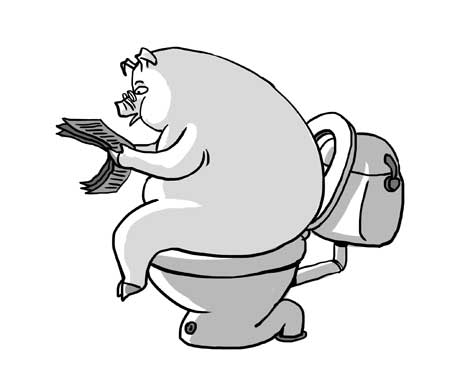Potty pigs could ease China's water woes
 |
|
[By Liu Rui/Global Times] |
What's the most important news that you've read about recently? Events in the Arab world? China's unusual winter weather? The inflation rate?
Well, for me it was a story with profound implications for the country and one that has the sweet smell of success written all over it: Pigs can be toilet trained!
Readers, please get serious. After you stop laughing and compose yourself, consider the facts.
Pig farming is a dirty, stinky business. Pig poop and urine cause severe environmental damage. Runoff pollutes rivers and generates copious amounts of carbon dioxide contributing to global warming. And that distinctive overpowering smell of pig poop stinks to the heavens. Current pig farming methods result in a monumental waste of water, lost or mediocre fertilizer, decreased fertility and increased disease.
Since the Global Times is a family newspaper, I won't get too graphic here. Suffice it to say that pigs have been trained in a pilot project in Taiwan to use litter boxes and grated areas in a small part of their environment to take care of business. Training can take as little time as a few days.
Consider the impact of potty-trained porkers on Taiwan and its population of 23 million people and over 6 million pigs. If all pigs were toilet trained in Taiwan, it is conservatively estimated that at least half of the 180 million liters of water used daily would be saved. And since the pig poop is not watered down, it is more concentrated and fetches a higher price as fertilizer, biogas generator and even, after further processing, fish and bird feed.
One farmer in the pilot project quintupled his income from these sales after potty-training his pigs.
This use of extremely simple technology has other benefits. As the need to flush the entire pig pen with water was eliminated, the pigs are also less likely to catch colds. That helped raise the survival rate of the pigs from 70 to 90 percent, a result that goes directly to the bottom line. Also the total cost of power and water no longer literally go down the drain, but are much reduced.
Chinese mainland's estimated pig population of 500 million constitutes half of the world's pork supply. Doing some simple math and assuming that the mainland's similar results to those in Taiwan, the water saving is an astounding 7.5 billion liters every day. Surely this will contribute to helping to address the mainland's severe water shortage, while at the same time significantly reducing pig pollution currently seeping into the mainland's waterways.
 0
0 






